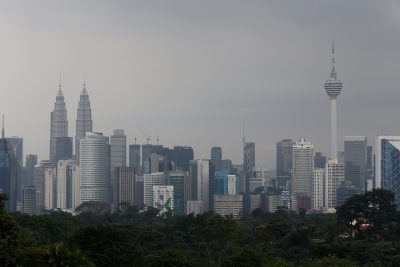Decentralisation the best bet for Malaysia’s growth
Malaysia’s burgeoning middle class has high expectations for future economic development. But the nation won’t escape the ‘middle-income trap’ and won’t have socially-inclusive growth under current government policies. A range of reforms that deliver decentralised decision-making is needed to build the knowledge-led economy to propel Malaysia to the next level of development.

Malaysia’s current policy framework has its roots in the 1970 New Economic Policy (NEP) and its socio-political counterpart ‘Ketuanan Melayu’ (Supremacy of Malays). NEP has succeeded in building a large Malay middle class that is informed, skilled and confident about its identity. But it’s also well aware that these two policies rooted in the past are not capable of transforming Malaysia into a developed nation.
To meet these aspirations, reform is urgently needed in three key economic areas. Each area requires a common reform component: the careful entrenchment of decentralised decision-making.
First, the state’s administrative structure inhibits innovative policymaking and prevents effective oversight. The federal government is much larger and more cumbersome than state governments and has disproportionate power.
Contrasting budgets and spending power reveal the imbalance between federal and state governments. The federal government has legal authority to impose income and sales taxes. But state governments must rely on land-related transactions and fees on small-ticket items like hawker licenses for independent revenue. The provision of most public services is done through branches of federal ministries operating at the state level.
State expenditure is determined by fiscal allocations from the federal government to state governments, and the amounts allocated depend on political considerations. Under the former Barisan Nasional (BN) government, opposition-controlled states received budgetary allocations that were proportionately much smaller than BN-controlled states. State governments are banned from borrowing to finance development projects, and that means they are unable to raise revenue to build the infrastructure needed to clear production bottlenecks in local industries.
Growth requires state governments that are empowered to plan and implement their own development strategies. Effective decentralisation requires each state government to have its own civil service. States will also need much larger shares of tax revenue, based on factors like developmental stage and tax revenue contribution. They should also be allowed to borrow to finance local infrastructure projects — with the commitment that there will be no federal bailouts — and be invested with significant responsibilities that are currently held by federal ministries.
The second key task is reforming government-linked corporations (GLCs). GLCs are crowding out the private sector, reducing economic dynamism. They also enable corruption that increases income inequality.
GLCs may perform well in theory, but they don’t in practice — officials inevitably use them for political patronage and personal corruption. GLCs are political creatures, not economic instruments.
Competition between GLCs and private firms is intrinsically unfair and harmful for overall growth. No matter how inefficient GLCs are, they can always count on government bailouts. They undermine economic dynamism by buying up their more efficient private competitors. Worse still, they prevent the development of a dynamic Malay business community by pulling capable Malays entrepreneurs away from starting private businesses and into cozy, life-long GLC jobs.
Downsizing the state-related sector through privatisation is necessary for economic efficiency, political accountability and income equality. The only two considerations in choosing buyers should be the size of the bid and the promotion of industry competition. A well-prepared and transparent privatisation process is more important than a speedy one.
The third key economic reform task is diversifying and expanding the banking system. The financial sector’s monopoly structure damages economic performance and worsens income inequality by suppressing the operations of small and medium-sized enterprises (SMEs).
The 1997 Asian financial crisis convinced the Malaysian government that the banking system would be less prone to crisis if regulators could more easily monitor them. The result was the forced consolidation of smaller banks into 10 big banks in 2000.
This action made state investment companies the controlling shareholders in most commercial banks, effectively creating a state-owned banking monopoly. These banks are slow in adopting better payment practices and providing new financial products, shoddy in their treatment of small retail customers, and biased in lending towards GLCs. The small number of banks and the extent of state control in the largest banks are to blame.
One serious defect of the bank consolidation was that Malaysian SMEs began experiencing difficulties in getting capital from the large banks, replicating the international experience that SME financing comes mostly from small and medium-sized banks. In response, the Malaysian government established the state-owned SME Bank in 2005. But the SME Bank is not meeting the sector’s capital needs. It also has the highest non-performing loan ratio in the banking industry. The slow growth of the SME sector means new Malay businesses are not emerging and the distribution of income is worsening.
Reforming the banking sector will mean allowing private small and medium-sized banks to exist again, reducing the government’s bank share holdings, and removing restrictions on foreign banks and their activities.
The NEP is essentially ‘Ketuanan Centralisation’ (Supremacy of Centralisation) in the economic sphere, manifesting as ‘Ketuanan Federal Government’ in governance, ‘Ketuanan GLC’ in production, and ‘Ketuanan Monopoly Bank’ in finance.
NEP cannot mobilise the entire brain-power of Malaysia for knowledge-creation because it prevents entrenchment of excellence in socio-economic institutions, and induces brain drain and capital flight. For Malaysia to escape the middle-income trap, ‘Ketuanan Centralisation’ must be purged from the public policy framework to make way for knowledge-led growth.
Wing Thye Woo is President of the Jeffrey Cheah Institute on Southeast Asia and Director of the Jeffrey Sachs Center on Sustainable Development at Sunway University and Professor of Economics at the University of California at Davis; he holds adjunct academic positions at Fudan University and Chinese Academy of Social Sciences.
This article first appeared in East Asia Forum on 24 March 2019.



